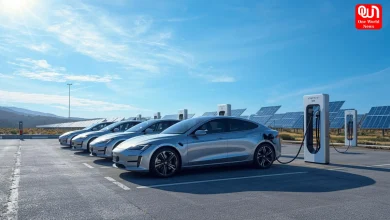#TechieTuesday: Is India ready for Electric Vehicles? Understanding the concept

Indian Government plans to place 30% of electric vehicles by 2030
Electric Vehicles are getting extremely popular in Europe and North American markets. Tesla’s popularity has a big role as it is forcing other major automobile companies to switch to electric vehicles. We all know that electric vehicles are the future, but India which could become one of the biggest markets for the key players doesn’t have a lot of eletric vehicles. The article will focus on what’s going on with electric vehicles in India and is the country ready for the transition?
Why electric vehicles matter to India?
India which has six cities in the list of most polluted cities of the world (declared by WHO), electric vehicles makes a lot of sense. Electric vehicles are cheaper to operate as well as it can help in saving the environment from pollution.
What’s going on with the manufacturers?
Mahindra is leading the revolution of electric vehicles in India. The company has been producing EVs for 9 years and has 5000 e-Cars on the roads in India. Mahindra is expected to launch electric variants of two of its popular vehicles – XUV 300 and KUV100. They will also launch a third product in collaboration with Ford Motor Company.
Mahindra has launched an electric sedan E- verito. An electric three-wheeler ‘Treo’ was launched a few days before and the company also collaborated with startups like Smart E to supply its eco-friendly vehicles.
The automobile giant along with South Korea’s LG Chen set up a lithium-ion battery manufacturing plant in Maharashtra. They have also invested more than 1000 crore on setting up a capacity to manufacture and develop electric powertrains in Karnataka. These powertrains will be supplied to other auto manufacturers in closing subsidiary Ssangyong Motor Co.
Other car manufacturers such as Tata, Hyundai, and Nissan are deliberately working in manufacturing electric cars. Hyundai has launched Kona car and Nissan is expected to launch the Leaf model soon.
What is the Indian government is doing to encourage electric vehicles in India?
Transport Minister Nitin Gadkari in 2017 shocked the world by saying that he intends to move 100% electric cars in India by 2030. It seemed an ambitious target as even France and the UK were hoping to replace all the conventional combustion-engine cars only by 2040. However, Nitin Gadkari, Transport Minister in Modi government diluted his target and reached to 30% from 100%. Fear of job losses and pushback by the auto industry were amongst the reasons for the government to do so.
In the last financial year, about 3.4 million cars and 21.2 million two-wheelers were bought in the country as per the data by Indian automobile manufacturers. A total of 0.7 million three-wheelers were also sold last year.
The new proposal of government aims more electric three-wheelers by 2023 and electric two-wheelers by 2025 in the country.
In an effort of pushing ahead the goal to have more electric vehicles in India, the country started the second phase of the (FAME 2) ‘Faster Adoption and Manufacturing of Hybrid and Electric Vehicles’ scheme with an outlay of Rs 10,000 crore. The amount may not look significant in comparison to developed countries but it can restore the confidence of investors and customers alike.
Tax benefits to customers who buy electric vehicles
Finance Minister Nirmala Sitharaman announced income tax rebates of up to Rs 1.5 lakh to customers on the interest they pay on loans on buying electric vehicles. This will account to the total exemption benefit of 2.5 lakhs over the total loan period. Custom duty exemption on lithium-ion cells was reduced by the finance minister which will result in a lower cost of lithium-ion batteries in the country as they are not locally produced. The government will give benefit in investment-linked income tax exemptions under Section 35 AD of the Income Tax Act, and other indirect tax benefits to manufacturers of components such as lithium storage batteries and solar electric charging infrastructure.
To encourage electric vehicles in India, the government could also learn a few lessons from countries like China and Norway who have opened doors for revolution in the electric vehicles segment. Chinese authorities have encouraged sales of EVs partly by placing caps on the number of conventional combustion vehicles which could be sold in the most polluted and congested cities. Norway, on the other hand, has planned to phase-out combustion vehicles by 2025. Half of the cars sold in Norway last year were electric cars.
Read more: How ‘10 PSU Banks-merger into 4 Banks’ will impact government and the common man
Encouraging Signs for India
Charging stations are built in malls, government offices and within neighbourhoods. Power companies owned by government such as Energy Efficiency Services and Bharat Heavy Electricals have planned to roll out charging stations soon. EES has estimated to roll out 10,000 stations in the coming two years.
Electric buses can be spotted in many cities. New Delhi is expected to see 1,000 electric buses on the roads soon. Several models of electric bikes are available. Taxi-delivery apps and home delivery services are now focusing on using electric bikes. Ola which tried hands at electric cabs is now planning to focus on e-bikes and three-wheelers.
Have a news story, an interesting write-up or simply a suggestion? Write to us at info@oneworldnews.in







